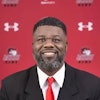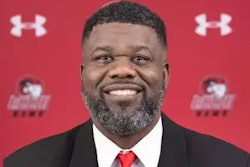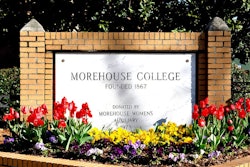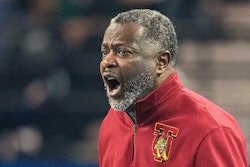As I settled in to listen to a panel of four recently graduated student-athletes discuss their views on college athletics, the last thing I expected to hear about was The World Bank, the United Nations and various countries’ GNPs.
The event was a national symposium sponsored by Northeastern University’s Center for Study of Sport and the day’s focus was the welfare of the student-athlete. As a former All-American basketball player — and having worked at the NCAA and most recently as Associate Commissioner of the Southeastern Conference — I was interested in the direction the dialogue would take.
The discussion began with a powerful story told by Byron Hurt, a former quarterback at Northeastern University, about his last play in college. He very vividly described standing in the pocket and firing a pass toward the sideline. His voice grew more passive as he told of the pass being intercepted and returned for a touchdown. What was most disturbing was the lifeless way in which he told the group that at that point he could not have cared less about the interception, the ensuing loss and the end of his college athletic career. “The game was no longer fun,” he said. “They killed all of the love I had for it.”
Tasha Downing, a former track student-athlete at The University of Florida, told of being pressured to return from an injury sooner than her body was telling her, resulting in a more serious injury. And still another, Myles McLean, a former linebacker at Northeastern, talked of feelings of racial isolation on what was an overwhelmingly white campus.
The panelists then began to discuss the need for student-athletes to have a voice in helping to shape athletics policy at both the institutional and national levels. Particular attention was paid to the NCAA’s failure to provide a meaningful vehicle for such input into its restructuring proposal which was adopted during its January 1996 Convention, prompting McLean to liken their status to that of a Third World country. In most world governance agencies such as The World Bank and the United Nations, he pointed out, those countries with the with the largest GNP or greatest military power control the vote. Third World countries, he continued, are largely unheard from and, more often than not, simply viewed as pawns in world power politics.
Various administrators, some senior ranking NCAA officials, were challenged to respond to this concern. Unfortunately, their responses served only to highlight just how far apart student-athletes and administrators are in their perception and understanding of today’s student-athlete experience.
For example, more than one administrator indicated that a formalized mechanism for student-athlete input at the national level was largely unnecessary. If student-athletes have concerns, the administrators said, they should discuss them with their athletics directors and coaches. But in the minds of the panelists, voicing concern about a coach’s overemphasis on athletics, gender or racial discrimination, or questionable ethical behavior — especially to the coach or athletic director involved — will more likely result in them being labeled a “bad apple” or “malcontent,” or worse. Many coaches feel that student-athletes who are not eternally and uncompromisingly “loyal” to the program do not deserve to have their one-year scholarship renewed.














